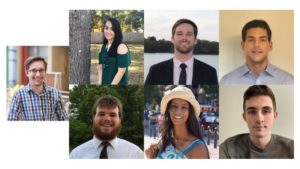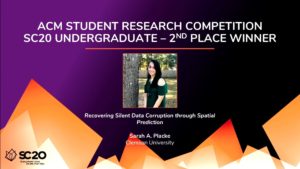A team of Clemson computer engineering and computer science students was one of only 19 teams worldwide chosen to compete in this year’s Student Cluster Competition at the annual International Conference for High-Performance Computing, Networking, Storage, and Analysis (SC20). The group competed among 19 teams during the 72-hour challenge, held in a virtual format for the first time due to the coronavirus pandemic.
This was the first year for Clemson to compete in the SC20.

The six-student team, named Dabo’s Tech Support, was tasked with completing a series of real-world scientific workloads using production-level applications from a variety of domains such as CESM and GROMACS over the 72-hour period. The challenges simulate what it is like being a researcher who uses these applications daily.
In addition, the team had to replicate the results of a paper from the previous year’s challenge and write a reproducibility report, and finally, run the same benchmarks used to rank faster supercomputers to determine which team built the fastest cluster.
The team, which was one of only 9 U.S.-based teams to compete this year, was sponsored by Dell Technologies and CCIT, and is made up of:
Griffin Dube – Computer Engineering
Nikolas Heitzeg – Computer Engineering
John Hollowell – Computer Science
Cavender Holt – Computer Engineering
Sarah Placke – Computer Engineering
Sansriti Ranjan – Computer Engineering
Advisor – Dr. Jon Calhoun
Team Dabo’s Tech Support team page can be found at: https://www.studentclustercompetition.us/2020/Teams/Team15/index.html
 In addition to a strong showing in the team competition, narrowly missing the Top 10 and beating some top-named schools such as MIT and local teams such as NC State and Wake Forest, Clemson team member Sarah Placke won second place at the ACM Undergraduate Student Research Competition. Placke, a senior computer engineering major, presented her research “Recovering Silent Data Corruption through Spatial Prediction” during the SC20 conference.
In addition to a strong showing in the team competition, narrowly missing the Top 10 and beating some top-named schools such as MIT and local teams such as NC State and Wake Forest, Clemson team member Sarah Placke won second place at the ACM Undergraduate Student Research Competition. Placke, a senior computer engineering major, presented her research “Recovering Silent Data Corruption through Spatial Prediction” during the SC20 conference.
The Student Cluster Competition was developed in 2007 to provide an immersive high-performance computing experience to undergraduate and high school students. For SC20, the competition was moved to the cloud to accommodate remote participation, becoming the Virtual Student Cluster Competition (VSCC). With sponsorship from vendor partners, student teams design and build virtual clusters in the Microsoft Azure cloud, learn scientific applications, apply optimization techniques for their chosen cloud configurations, and compete with teams around the world to complete a set of benchmarks and real-world scientific workloads.
For more information on the competition and the SC20 Conference, visit: https://sc20.supercomputing.org/program/studentssc/student-cluster-competition/
